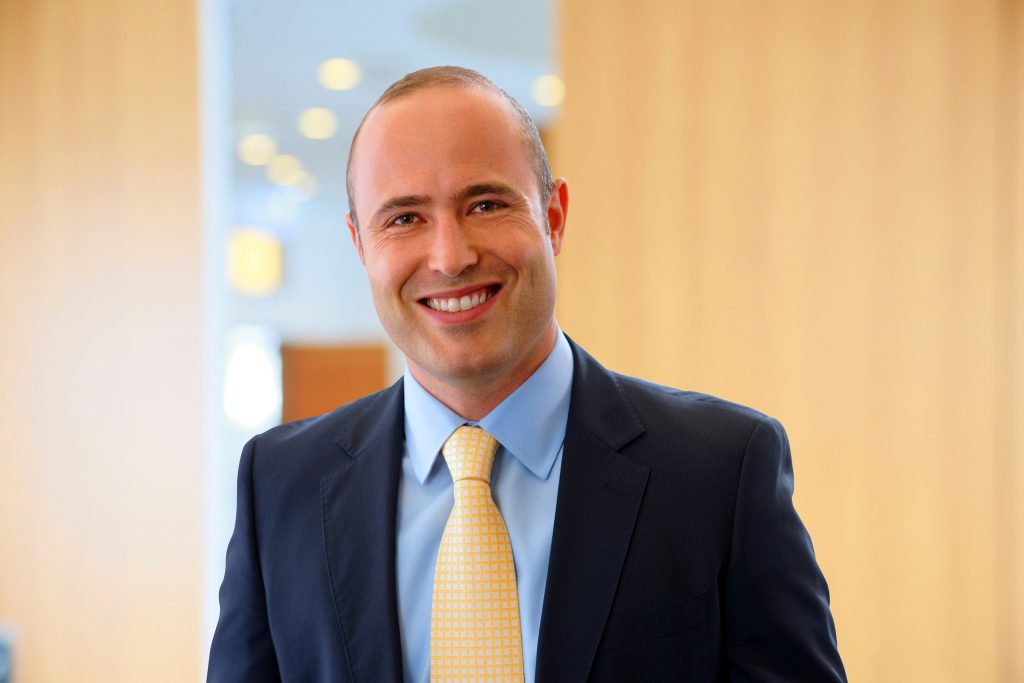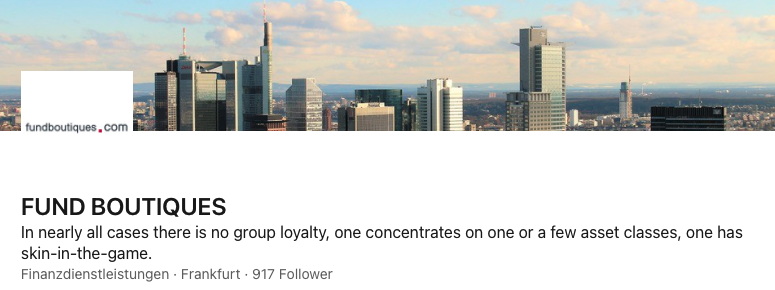Markus Hill spoke for FUNDBOUTIQUES.COM with Tommy Piemonte, Head of Sustainability Research, Bank für Kirche und Caritas eG (BKC), about his motivation for dealing with the topics of sustainability, ratings, CAT bonds, and the banks’ activities within the framework of the European investor initiative “Shareholders for Change” (SFC). In this context, the Institute’s current joint activities with the Brazilian Bishops’ Conference (CNBB) and the Global Catholic Climate Movement (GCCM) to protect the Amazon rainforest also represent a special commitment.
Hill: Since when and why are you enthusiastic about sustainable investments?
Piemonte: To explain, I have to go back to the very beginning, when I first learned about sustainable investments. After my training at a savings bank, I joined Deutsche Bank, where I worked in private banking, among other things. That was over 20 years ago now. Looking back then, I would say that I was the typical banker of the 90s – the focus was on maximizing profits for my clients, increasing my bonus, and developing my career. I gave no thought whatsoever to the positive and negative sustainability impacts of the securities and investment products I sold. Even worse – I had a complete blind spot as far as externalities of investments were concerned. At the same time, I regularly had doubts about the meaningfulness of my activity and had always been interested in environmental protection and social issues. In this mixed situation, perhaps by chance or instinctively, I came across one of the few sustainability funds at the time, of which perhaps, there was a handful in Germany. I began to inform myself about the concept and the background of applying sustainability aspects to funds. And so it happened, all of a sudden, the following quote applied to me “Even a small flash of enlightenment brings clarity to the darkness”. From now on, I was convinced that the full integration of sustainability aspects into the financial industry and the financial market is necessary so that they are part of the solution to our global challenges in the future and no longer part of the problem. That was the point where my socially responsible investing (SRI) career started. I quit my job at the bank and started studying economics at the Nürtingen University of Applied Sciences. After graduation, I started as a junior analyst at the sustainability rating agency imug Rating, which is still a research and distribution partner of the international sustainability rating agency Vigeo Eiris. I stayed at imug Rating for several years and went through all career stages, up to Head of imug Rating. And for five years now, I have been working at the Catholic church bank Bank für Kirche und Caritas (BKC) in Paderborn as Head of Sustainability Research.

Hill: What are your activities at the Bank for Church and Caritas (BKC) and why did you change there?
Piemonte: Working at a sustainability rating agency is exciting and varied, and by asking specific questions and assessing the sustainability performance of companies, very often sustainability improvements were initiated at the companies. This latter aspect particularly appealed to me and I was therefore even more convinced of the effectiveness of so-called “engagement”, which is practiced by investors and asset owners. Engagement is generally understood to be the active exertion of influence on investment objects. The aim is, for example, to motivate companies to realize improvements in their respective sustainability management or to take existing controversial incidents as an opportunity to derive appropriate consequences and concrete preventive measures for the future. This is how I came to accept the offer of BKC to be responsible for the further development and monitoring of the ethical-sustainable investment strategy of the bank and its clients, as well as to professionalize the ethical-sustainable investment process and to accompany the coordination of the research process. And on the other hand, it was my wish to set up the topic of engagement holistically for the bank.
Hill: What does BKC’s engagement approach look like and what is special about it?
Piemonte: The so-called “engagement” is often referred to in German as active shareholders. However, we do not only conduct our engagement activities with equity companies, as the term “active shareholder” might suggest, but also with bond-issuing companies or other investment objects. In addition, we actively influence industry associations, politicians, and financial market players at a higher level to improve the integration of sustainability aspects in their fields of activity.
We exert our influence as an investor by exercising voting rights on shares (“vote”) and constructive dialogue (“voice”) with the investment objects. Dialogue, which takes place through written or personal communication with company representatives, through speeches at general meetings, or through participation in public investor campaigns, is of particular importance in our engagement strategy, as we attribute a high degree of influence to it.
We are convinced that through targeted engagement we can both reduce or even prevent negative sustainability impacts of investment objects and promote positive sustainability impacts. In addition, we believe that the risk-return profile of an investment can be positively influenced by engagement.
A special feature of our engagement activities is that we do not limit them to our ethical-sustainable investment portfolio, as is common with the engagement concept often found in the financial market called “shareholder activism”. This means that we also enter into an active dialogue with companies to motivate them to change towards more sustainability if they violate our exclusion criteria or do not perform to our satisfaction in the positive and negative criteria we have established. The only motivation is that we actively want to see sustainability improvement. We call this engagement concept “shareholder criticism”. The difference in the concepts is that with shareholder activism, engagement activities are carried out with companies where either an investment has already been made or there is an intention to invest. In this case, the demands on the company can also have the motivation to achieve an improved risk-return profile of the investment, e.g. through the reduction of lawsuit or reputation risks, by improving the sustainability impact on the company. In contrast, shareholder criticism does not involve any risk-return considerations on the part of the investor.
To give our actions influence the greatest possible impact and efficiency across the board, we pursue engagement through a total of three channels. Firstly, we have outsourced the engagement activities for some of our investments to an external service provider with extensive expertise in sustainability issues. Secondly, we conduct company dialogues or exercise voting rights together with other institutional investors through the international engagement network Shareholders for Change (SFC), which we co-founded. In addition, we also cooperate with other sustainability investors on individual engagement activities and join forces to form a larger investor group. As a third building block, we carry out some targeted engagement activities on our own.
Hill: Briefly introduce Shareholders for Change (SFC). What exactly does this organization deal with?
Piemonte: Shareholders for Change is a relatively new engagement network founded on 6 December 2017 by and for European institutional investors. The seven founding member companies come from five European countries. As of April 2021, SFC now consists of 11 European member companies from seven countries, managing approximately €30 billion. The founding idea of Shareholders for Change as an association of European institutional investors follows a simple principle: together you are stronger than each individual alone, you achieve a greater breadth of engagement activities and you also share the work. In this respect, the SFC stands out from other engagement associations. SFC members are united by a common vision and shared values on a wide range of sustainability issues. These shared values are at the heart of their joint engagement activities and are an integral part of the members’ business practices. Although not a statutory admission criterion, the SFC network is nevertheless focused on attracting small and medium-sized institutional investors as members who wish to expand their engagement activities.
SFC activities focus on joint engagement with primarily European companies. The focus here is on organizing and preparing joint participation and voting at the companies’ annual general meetings or coordinated dialogue with them. To concentrate the engagement activities somewhat, there is a focus on three sustainability blocks:
(a) Labour rights and human rights
b) Tax practices and tax justice
c) CO2 emissions and climate change
SFC uses all available means of investor influence to motivate companies and other investment objects as well as financial market actors to adopt more sustainable behavior and thereby contribute to sustainable development. In addition, Shareholders for Change work with institutions, associations, and other public or private organizations to support the development of sustainable financial markets and a sustainable economy that is aligned with the Sustainable Development Goals (SDGs).
Hill: What does a practical example of SFC or BKC engagement look like?
Piemonte: Well, let’s take a look at our engagement with CAT bonds funds, which BKC also does on behalf of Shareholders for Change. Catastrophe bonds transfer some of the risks of natural disasters from states and people directly to the capital markets. Generally speaking, we, therefore, consider catastrophe bonds to be a financial product (asset class) that can have a positive effect from a sustainability perspective. However, the prerequisite for this is that the insurance transactions contained therein cover sustainable insurance purposes in the event of an incident, such as for residential property, and do not include insurance purposes that run counter to sustainable development. Although catastrophe bonds can be a vehicle to address the impacts of weather-related disasters, which are also related to climate change, there is very little transparency regarding climate-related or other sustainability aspects in CAT bond contracts. The danger of this lack of transparency lies, among other things, in the fact that in the event of an incident, the insurance policies underlying the CAT bond take effect, for example, for a coal-fired power plant and finance the reconstruction of this coal-fired power plant after a hurricane.
The asset class of CAT bonds is still relatively young and there is still a great need for action on the part of the fund industry in terms of transparency and sustainability. For this reason, BKC started an engagement dialogue with the CAT bonds fund manager Plenum Investments AG in 2018, which we concluded very successfully two years ago, to initiate a change here. Among other topics, the dialogue focused on supporting the fund management in setting up a sustainability audit and an engagement process with the sponsors (reinsurers) of the CAT Bonds. Also through the BKC engagement, Plenum Investments AG has, among other things, expanded its set of exclusion criteria for the CAT Bonds investment process, for example, to include all methods of unconventional oil and gas production. At the same time, a solid sustainability process was implemented, which can be rated as the best practice in the industry. It is particularly pleasing that Plenum Investments AG itself is now in contact with about 50 sponsors (reinsurers) of CAT Bonds to achieve more transparency about their insured objects as well as to motivate for the introduction of exclusion criteria for the insurance business. This development is remarkable because the BKC engagement has thus triggered multiple engagements – a “domino engagement”, so to speak. The fact that we are specifically naming a fund company here is part of our BKC engagement strategy. In addition to the transparency of our engagement activities, this pursues an even more important aspect. As an investor or potential investor, there are various means of exerting pressure on investment objects to motivate them to be more sustainable. These range from the merger of several large investors to divestment, to “shaming”, i.e. the public denunciation of sustainability deficiencies. In an industry or on a topic where there is no sustainability standard or best practice examples, however, “shaming” does not develop its full impact. This is because all investment objects are at the same level and thus making them publicly comparable triggers no or only little competitive or consumer pressure. Therefore, our tool of choice here is “farming”, where we support and highlight the pioneer in its sustainability efforts, on the one hand, to acknowledge the successes and on the other hand to motivate the laggards to catch up.
In the meantime, we have started an engagement dialogue with three more CAT Bonds fund managers. We will continue these dialogues intensively to further advance the developments in this sector towards more transparency and the consideration of sustainability risks.
Hill: What are your current topics?
Piemonte: Together with the Brazilian Bishops’ Conference (CNBB) and the Global Catholic Climate Movement (GCCM), we are currently leading an international group of almost 100 Catholic institutions from 18 countries to persuade the Brazilian government to do more to protect the Amazon rainforest and the indigenous people living there. This alliance represents the first commitment of this magnitude by Catholic investors worldwide and also underlines the urgency of the ecological and social problems in the Amazon. In a letter sent to high-ranking Brazilian government representatives on 29 March, detailed demands are made to protect the rainforest and the indigenous population. The aim is to motivate the Brazilian government in an engagement dialogue to finally respect human and environmental rights in the Amazon.
Hill: Thank you very much for the interview.
Tommy Piemonte has been working as Head of Sustainability Research at the Bank für Kirche und Caritas eG since 1 July 2016. Mr. Piemonte is responsible for the further development, operational implementation, and monitoring of the bank’s ethical-sustainable investment strategy. He is also responsible for the related engagement activities, i.e. actively influencing companies, states, or other investment objects concerning their sustainability efforts. In this context, he is also the Bank’s representative and a founding member of the European engagement network of institutional investors Shareholders for Change. (Tommy.Piemonte@bkc-paderborn.de / Tel.No. ++49 (0)5251/121-1141)
Bank für Kirche und Caritas eG (BKC): LINK
Information on “ESG in the ILS & Catastrophe Bond Market” -ARTEMIS: https://www.artemis.bm/news/esg-in-the-ils-catastrophe-bond-market-roundtable/ (Participants: Tommy Piemonte, Head Sustainability Research, Bank für Kirche und Caritas eG, Shareholders for Change, Nico Rischmann, Partner, ESG-Competence Center, Plenum Investments Ltd, Paul Schultz, CEO, Aon Securities, Cory Anger, Managing Director, GC Securities, Patrick Roder, Associate Partner, Synpulse Management Consulting, Roland Kölsch, Managing Director, QNG (sustainability FNG-Seal), Andy Palmer, Head ILS Structuring EMEA & APAC, Swiss Re Capital Markets Ltd, Dirk Schmelzer, ILS Fund Manager, Partner, ESG-Competence Center, Plenum Investments Ltd).

Related Interviews:
- Foundations, Asset Management, ESG – “Crime, Rollski & Gin” – Virtual Day for Foundation Assets – 12.5.2021 (Interview – Tobias Karow, STIFTUNGSMARKTPLATZ.EU)
- ESG, Climate Change, SDGs – CAT Bonds, Ratings & Volcanoes (Interview – Roland Kölsch, Qualitätssicherungsgesellschaft Nachhaltiger Geldanlagen)
- ESG, Cat Bonds, Industry & Cooperation, “Tail-Risks” and Asset Management (Interview – Nico Rischmann, Plenum Investments AG)
